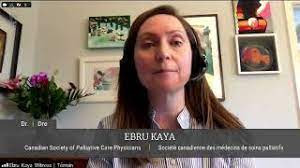Executive Director, Euthanasia Prevention Coalition
Dr. Ebru Kaya is an associate professor of medicine and the president of the Canadian Society of Palliative Care Physicians (CSPCP) and Dr. Leonie Herx is division chair and associate professor of palliative medicine at Queen’s University and a past president of the CSPCP wrote an opinion article that was published by the Globe and Mail on May 9, titled: Assisted dying must not be confused with palliative care.
The context for the article is the government committee that is examining the expansion of MAID to children (mature minors) and incompetent people who requested death in their advanced directive. Kaya and Herx continue:
While access to MAID is guaranteed in Canada, access to palliative care and other supports, including home and disability services, are not – and worse, MAID is being provided at the expense of already limited palliative care resources. No one should feel compelled to choose an early death because of inadequate care. Tragically, too many physicians know of patients who opted for MAID due to lack of adequate palliative home-care resources to remain in their homes or communities.They explain that Canadians lack the necessary information to seek palliative care, rather than MAID but then MAID is now being integrated with palliative care. They write:
Palliative care is a vital service, with clear economic, health and social benefits. It provides medical assistance in living (MAIL) through early identification and impeccable assessment and management of pain and other symptoms – physical, emotional, social and spiritual – that enhance quality of life, reduce depression and anxiety, reduce caregiver distress and may even help people live longer; it does not hasten death, nor does it end life. The National Framework on Palliative Care received unanimous support by parliamentarians in 2018. Yet palliative care has not received the necessary investments and attention to make it a reality for Canadians.
Moreover, many palliative care services have had to integrate MAID into their programs in order to continue to receive provincial or federal funding, even though they are fundamentally different. As a result, already scarce resources – including hospice and palliative care unit beds, as well as skilled nurses and doctors – have been diverted to support MAID services.They then point out how MAID is an act that is used by the privileged:
Palliative care must remain separate from MAID to avoid the risk of confusion between the two. This is especially important for communities that have an underlying distrust of the health care system who decline palliative care because they confuse it with MAID. This does not preclude people who contemplate, request or opt for MAID from receiving palliative care – but in order to make informed choices, patients and family caregivers need to know what palliative care actually has to offer.
As a person approaches the end of his or her life, the inevitable physical decline is viewed in Western European culture as undignified, full of suffering, and a burden on caregivers. However, this belief is not shared by all cultures. Indeed, it should be noted that white, well-educated and wealthy Canadians have led the advocacy for legalization and expansion of MAID; it is not, however, this demographic that bears the pressures to choose MAID due to lack of access to palliative care and other supports needed to live. The government focus on MAID thus disproportionately benefits the already privileged, while continuing to underserve the rest of our society who might not have the same values or advantages.They conclude that MAID should not be associated or confused with palliative care.
Canadian legislation positioned palliative care as a safeguard to address suffering that might otherwise lead to MAID, and it has led to a tension between MAID and palliative care. As a result, physicians and organizations such as the Canadian Society of Palliative Care Physicians are seen as opposing MAID or obstructing access to MAID when they advocate for palliative care to address suffering.Thank you Dr's Kaya and Herx for once again defending the proper use of palliative care.
The expansion of MAID should not be considered without first addressing fundamental problems of inadequate access to care and resources. The expectation that MAID and MAIL can develop in parallel is a fantasy – and the most vulnerable among us risk paying the price.
More articles on this topic:




No comments:
Post a Comment